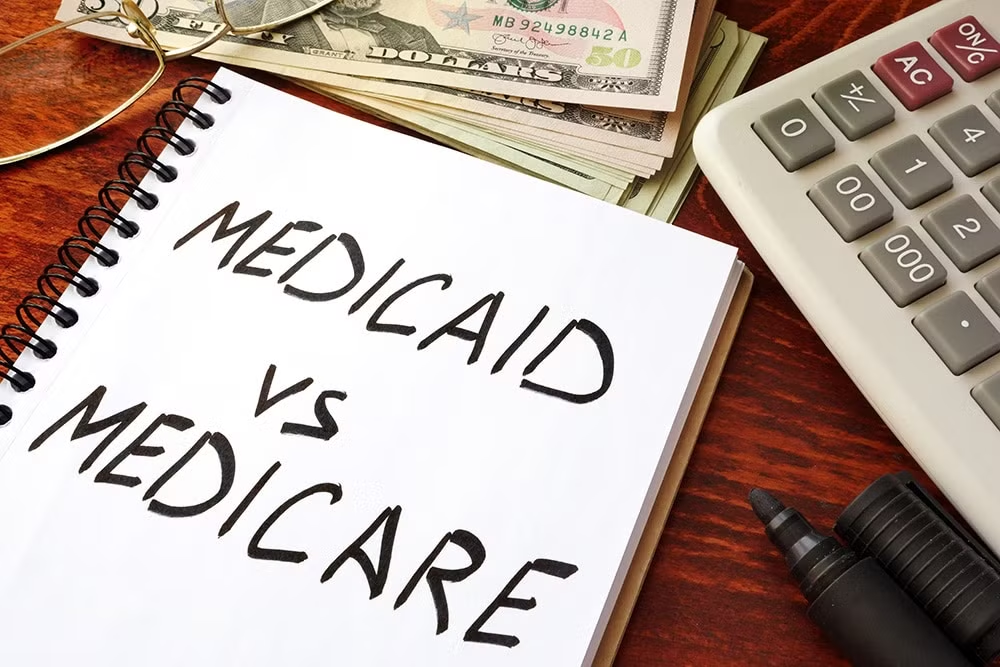New Hampshire Medicaid
At Live Free Recovery, we are proud to accept Medicaid coverage
Live Free Recovery Accepts New Hampshire Medicaid
Medicaid is a nationwide, federal program created to provide medical care and insurance to individuals and families that can not afford it 100% on their own. In order to qualify for NH Medicaid health plan, specific financial and other eligibility requirements must be met. Individuals who want ot use New Hampshire Medicaid to help cover the cost of addiction treatment can do so at Live Free Recovery Center. That’s because Live Free Recovery accepts New Hampshire Medicaid.
Similar to Medicaid, Medicare beneficiaries can help cover everything from routine doctor’s office visits and check-ups, to long-term health care services and Medical Assistance for the elderly and disabled. It can even help cover expenses related to mental health and addiction treatment.
When it comes to New Hampshire Medicaid, the following addiction treatment programs can be covered either partially or in full:
- Interventions
- Family counseling and therapy
- Inpatient treatment
- Outpatient treatment
- Detox
- Mental health services
At Live Free Recovery, we are proud to accept Medicaid coverage from those who have it and are in need of addiction treatment. Keep reading to learn more and should you have any questions you can either reach out to your Medicaid representative or us here at Live Free Recovery directly. We will be happy to answer any questions that you may have and get you on the road to recovery.
Who is Eligible For Medicaid in New Hampshire?
Sometimes states can have different requirements when it comes to who is eligible for Medicaid and who isn’t. In the state of New Hampshire, in order to have Medicaid eligibility, you must be a resident of the state as well as either a United States citizen, a U.S. national, a permanent resident of the country, or a legal alien. You must also meet certain financial requirements and contain a low-income or very low income individual or household.
In addition to these requirements, to receive New Hampshire Medicaid, you also must be one of the following:
- Pregnant women
- Blind
- Disabled (either you or a family member in your household)
- 65 or older
- Be responsible for a child 18 years of age or younger
I’m A Veteran, Can I Qualify For Medicaid?

The short answer to this question is yes. United States veterans are eligible to receive Medicaid benefits and many of them do. In fact, of the nearly 10 million non-elderly veterans in the United States, more than half of them receive at least some form of Medicaid benefits.
What’s The Difference Between Medicaid and Medicare?
It’s important to remember that while they both are government-funded programs, Medicaid and Medicare are not the same.
Medicaid
Medicaid helps those who may be struggling financially or live in low-income homes. As a result, Medicaid is an assistance program and available to anyone who qualifies regardless of age. People who are on Medicaid often pay very little if anything when it comes to medical costs and expenses.
Medicare
On the other hand, Medicare is a federally run insurance program that operates much in the same way private insurance does. Throughout a person’s life, he or she will pay into a Medicare program, oftentimes being taken out of their paycheck. Once a person turns 65, they are eligible for Medicare and their medical bills will then be paid out of the fund that they had paid into earlier in their life. Those under the age of 65 may also qualify for Medicare if they are disabled or suffer from certain medical conditions.
With Medicare, much in the same way they would with private insurance, people will often pay deductibles and other costs that they would with private insurance.

I’m In Need of Addiction Treatment. Will Medicaid Cover It?
Thanks in large part to the Mental Health Parity and Addiction Equity Act, those suffering from mental health and/or addiction issues who are on Medicaid can seek out treatment at little to no cost to them. In fact, federal guidelines require that Medicaid comply with parity requirements and provide the same level of coverage and care for those suffering from mental health issues and addiction that they would for other medical conditions. Below are some of the services that Medicaid will cover.
Detox
While many people might think the first step in the recovery process is to enter into a treatment facility, that is actually step #2. The first step is to go through detox.
The goal of detox is to rid the body of all the harmful substances that are in it so the healing process can begin. Due to the side effects associated with detox and withdrawal, detoxing should only be done under the care and supervision of trained medical professionals. Detoxing can be done at a dedicated detox facility, a treatment center that also offers detox services, or even at a local medical facility. Attempting to self-detox can be very dangerous and even life-threatening.
Many state-funded detox programs and facilities are set up for those who have Medicaid and might not be able to afford to go to a private facility. Once detox has been completed, then a person can enter into one of the following treatment programs:
Inpatient Treatment
Residential treatment, or inpatient treatment, is often the preferred treatment method for professionals. This is due in large part to the fact that while in treatment, individuals live at rehab facilities in structured environments and can have their progress closely monitored without any outside interference or distractions.
Since they are living at rehab facilities full time for the duration of their treatment, inpatient rehab patients can focus all of their attention on getting clean and sober. Inpatient treatment also provides those who are in treatment access to additional services such as around-the-clock medical supervision and nutrition.
Medicaid may cover some, if not all, of your inpatient treatment depending on your needs. If you are unsure if your Medicaid plan covers inpatient treatment or if it covers it in full or not, you can always reach out to your Medicaid representative or contact us here at Live Free Recovery.
Outpatient Treatment
For one reason or another, some people simply aren’t able to enter into inpatient addiction treatment. Such people might be the ones who provide the primary or even sole income in their households, and thus, can’t take the time off of work. Or such people might have other family or work-related responsibilities. In some cases, it might be deemed that their addictions don’t warrant or require inpatient treatment.
For those who choose not to enter inpatient treatment, outpatient treatment is the next best option. While outpatient treatment involves many of the same components as inpatient, including the various therapies, the main difference between the two is that outpatient rehab patients don’t live at the rehab facilities that they are receiving care at. Instead, outpatient rehab patients come to rehab facilities for their therapies and treatments and return back to their normal lives.
It’s important that outpatient rehab patients have supportive and safe home environments to return to. It is also important that their home environments are free of any temptations, such as drugs or alcohol.
Much in the same way that it does for inpatient treatment, Medicaid can also cover some, if not all, outpatient treatment patients. If you have questions about outpatient treatment or are curious if it is the right type of treatment for you, contact us today. We will work with you to not only pick out the best treatment option for you, but we will also go over any out-of-pocket expenses that you may incur to make sure that you can afford the treatment.
Co-Occurring Disorders
Not everyone who is suffering from a substance is dealing with just addiction issues. Some people are also suffering from mental health problems as well. In fact, in some cases, it’s those mental health issues that led people to use drugs and alcohol in the first place as a way of self-medicating. When someone suffers from both a mental health condition and a substance abuse issue, it is known a co-occurring disorder.
At Live Free Recovery we offer treatment programs for co-occurring disorders. The good news too is that all state Medicaid programs provide at least some type of mental health services. That means that if you are suffering from a co-occurring disorder that your Medicaid plan will likely cover, some if not all, of your treatment.
This can include:
- Counseling sessions
- Therapy sessions
- Medication-assisted treatment
- Peer support
- Social work services
- Various levels of care for addiction treatment
Will New Hampshire Medicaid Help Cover My Treatment?
Those suffering from addiction and mental health issues have enough going on that they have to worry about. The last thing that they should have to worry about is finances and wondering if they can afford to get the help that they need. For those who might struggle financially or come from a low-income home, Medicaid can be a great way to get the health coverage you need.
At Live Free Recovery, we not only accept Medicaid, but we will also work with you to make sure that you can afford your treatment should there be any out-of-pocket expenses. To learn more about our treatment programs or to get started on your road to recovery. Contact us today.
Did this article answer your questions?
"*" indicates required fields
Take the First Step Towards a Brighter Tomorrow
At Live Free Recovery, we’re committed to walking alongside you on every step of your journey. Our compassionate team is here to provide the guidance and support you need to overcome addiction and reclaim your life. Don’t wait—reach out today to speak with someone who truly understands your struggles and can help you take that important first step toward healing and a fresh start.
Your path to recovery starts here.
